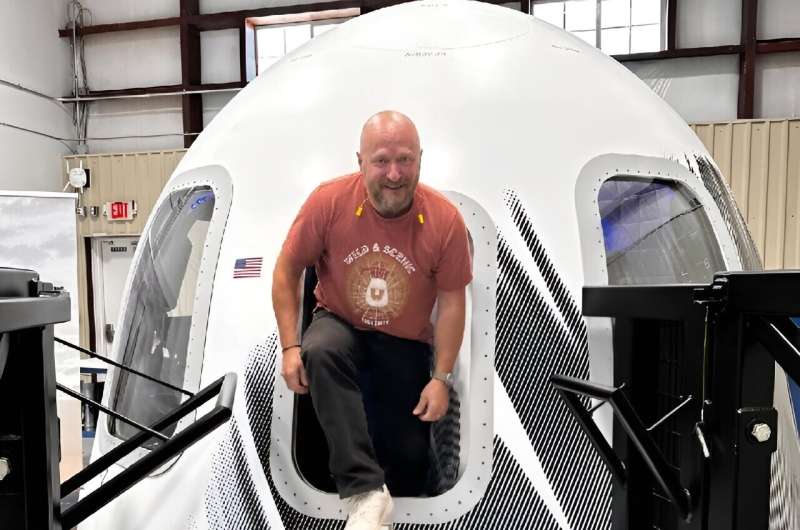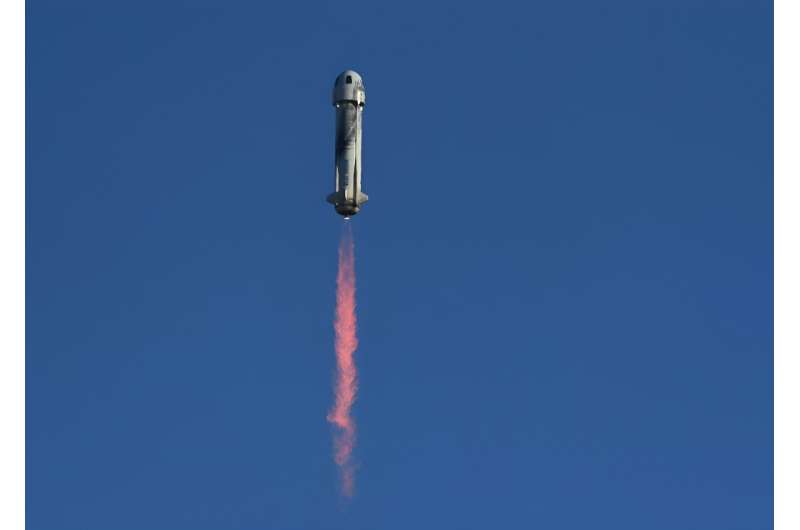He arrived in Texas, tried on his flight suit for the first time, and is now preparing to live out his childhood dream.
On Sunday, French entrepreneur Sylvain Chiron will board a Blue Origin rocket and blast off into space, joining the select group of humans who have ventured beyond Earth’s bounds.
“I never thought I’d get to do this,” the 52-year-old, who hails from the mountainous southeastern region of Savoy, told AFP in an interview two days before his adventure.
“We’re going to be astronauts for 15 minutes, so a bit like pretend astronauts, but astronauts nonetheless!”
Blue Origin’s spaceflights are brief hops just beyond the edge of space and back again—but still allow passengers to admire the curve of the Earth while free floating during a few minutes of weightlessness.
In all, the Jeff Bezos-owned enterprise has flown 31 humans to space on its New Shepard suborbital rocket system.
Sunday’s mission, the first with crew after a two-year pause, will see six people soar beyond the Karman Line, the internationally recognized boundary of space, 62 miles (100 kilometers) above sea level.
“This morning, I put on my flight suit for the first time—my wife found me very handsome as an astronaut,” Chiron joked on the phone, as he prepared for a day of training including a flight simulator.
What is he most looking forward to?
“Seeing the Earth from space,” he replied. “This feeling of leaving the world of men and seeing the Earth as a whole, from above, without borders, in all its fragility and beauty.”
It’s an exceedingly rare opportunity. Only 10 French space agency astronauts have ever gone to space. In 2023, French-Italian Ketty Maisonrouge flew to space with Virgin Galactic, a competitor of Blue Origin.

Expensive, but not crazy expensive
Prices for these ultra-coveted tickets are a well-guarded company secret.
“Yes, it’s expensive” but “not completely crazy either,” said Chiron. “There are some who would buy a pretty red car with this money.”
This thrill-seeker believes that the check he wrote was only a part of the reason he was selected.
“They received thousands of applications, from people much wealthier than me,” he said, and believes it was his lifelong passion for space that set him apart.
And he wants to become “an inspiration for young people” to follow their dreams and never give up—foremost his two children, aged 14 and 15.
Not to mention, “Dad’s going up in a rocket!” has a cool ring to it, he laughed.
‘Not risk-free’
Determined in his youth to become an astronaut, Chiron obtained his private pilot’s license at 16, then attended a summer program hosted by an American military academy for further flying lessons.
While in Florida, he couldn’t pass up the chance to watch launches of the iconic space shuttle.

“It was pretty incredible,” he recalls. “Not only were we flying, but we had the shuttle right there” on its launch pad, to admire.
Eventually he shifted his focus toward business studies, at Temple University in Philadelphia, and in Japan.
He also did military service and—true to his Alpine roots—was a ski instructor for French Air Force and NATO pilots.
About 25 years ago, he founded Brasserie du Mont-Blanc, now a major French craft brewery. He has since sold the company and is now working on a distillery project.
Aware of the criticism surrounding the emerging private space flight sector, he makes it clear he’s not at all a fan of the term “space tourism.”
Tourism is “taking a leisurely cruise and sipping a pina colada,” said Chiron.
“This is still an adventure which is not completely risk-free.”
In fact, he added, these early commercial flights contribute to the broader goal of space development.
“There are a lot of technological advances that have come about thanks to space research,” insisted the entrepreneur, recalling how the Apollo program was a catalyst for the modern computing industry.
“The indirect benefits are not necessarily obvious, but they are enormous.”
© 2024 AFP
Citation:
‘Dad’s going up in a rocket!’ French businessman set for launch (2024, May 18)
retrieved 18 May 2024
from
This document is subject to copyright. Apart from any fair dealing for the purpose of private study or research, no
part may be reproduced without the written permission. The content is provided for information purposes only.